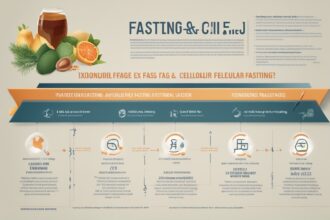Fasting has emerged as a powerful tool for enhancing health at the cellular level. By temporarily abstaining from food, the body shifts into a state of repair and rejuvenation, focusing on cellular renewal. This process, often referred to as autophagy, plays a critical role in maintaining optimal health and preventing age-related decline. In this article, we’ll explore the science behind optimizing cellular renewal through fasting, uncovering how this ancient practice can support longevity and vitality.
What Is Cellular Renewal and Why Does It Matter?
Cellular renewal refers to the body’s natural process of replacing old, damaged cells with new, healthy ones. This mechanism is essential for maintaining tissue function, repairing damage, and combating the effects of aging. At the heart of cellular renewal is autophagy, a process where cells break down and recycle their own components to eliminate waste and promote efficiency. Without effective cellular renewal, toxins and dysfunctional components accumulate, leading to inflammation, disease, and accelerated aging.
Fasting acts as a catalyst for cellular renewal by creating a metabolic environment that prioritizes repair over growth. When food intake is restricted, energy is redirected from digestion to internal housekeeping, allowing cells to focus on self-maintenance. Understanding how to harness fasting for optimizing cellular renewal through fasting can be a game-changer for long-term health.
How Fasting Triggers Autophagy for Cellular Renewal
Autophagy, often described as the body’s “cellular cleanup crew,” is significantly enhanced during fasting. When nutrient availability decreases, the body switches from storing energy to conserving and recycling it. This metabolic shift activates autophagy, enabling cells to break down damaged proteins, organelles, and other debris. Studies suggest that fasting for as little as 12–16 hours can initiate this process, with longer fasts amplifying the effects.
During fasting, levels of certain hormones and signaling pathways, such as mTOR (mechanistic target of rapamycin), are suppressed, while others, like AMPK (AMP-activated protein kinase), are activated. These changes signal the body to prioritize repair and renewal over growth. For those interested in optimizing cellular renewal through fasting, intermittent fasting (IF) or extended fasting protocols can be tailored to maximize autophagic activity. To learn more about the basics of intermittent fasting, check out our guide on Intermittent Fasting 101.
Benefits of Optimizing Cellular Renewal Through Fasting
The advantages of enhancing cellular renewal through fasting extend far beyond basic detoxification. Here are some key benefits supported by emerging research:
- Improved Longevity: By clearing out damaged cells, fasting may slow the aging process and reduce the risk of age-related diseases.
- Enhanced Immune Function: Autophagy helps eliminate pathogens and dysfunctional immune cells, strengthening the body’s defense mechanisms.
- Reduced Inflammation: Cellular renewal reduces the buildup of pro-inflammatory waste, potentially lowering chronic inflammation.
- Better Metabolic Health: Fasting supports insulin sensitivity and fat metabolism, which are closely tied to cellular health.
These benefits highlight why optimizing cellular renewal through fasting is gaining attention as a holistic health strategy. For a deeper dive into fasting’s impact on metabolism, explore our post on Fasting and Metabolic Health.
Types of Fasting for Cellular Renewal
Not all fasting methods are created equal when it comes to optimizing cellular renewal through fasting. Different protocols offer varying levels of autophagic activation, depending on duration and intensity. Here are some popular approaches:
- Intermittent Fasting (16/8 Method): This involves fasting for 16 hours and eating within an 8-hour window. It’s a sustainable option for beginners and can kickstart autophagy after 12–14 hours.
- 24-Hour Fasting: A full-day fast once or twice a week can deepen cellular repair by extending the fasting window.
- Extended Fasting (48–72 Hours): Longer fasts, under medical supervision, may provide more profound benefits for cellular renewal, as autophagy peaks after 24–48 hours.
- Water Fasting vs. Dry Fasting: While water fasting allows hydration, dry fasting (no food or water) is more intense and may accelerate cellular cleanup, though it’s not suitable for everyone.
Choosing the right fasting method depends on individual health goals and lifestyle. For guidance on starting a fasting routine, refer to our article on How to Start Fasting Safely.
Practical Tips for Maximizing Cellular Renewal During Fasting
While fasting naturally promotes cellular renewal, certain practices can enhance its effectiveness. Here are actionable tips for optimizing cellular renewal through fasting:
- Stay Hydrated: Proper hydration supports detoxification and cellular function during fasting. Drink water, herbal teas, or electrolyte solutions (without calories).
- Time Your Fast Strategically: Align fasting periods with your body’s circadian rhythm by starting in the evening, as autophagy may be more active during rest.
- Avoid Overeating Post-Fast: Breaking a fast with nutrient-dense, easily digestible foods prevents metabolic stress and supports ongoing cellular repair.
- Incorporate Light Exercise: Activities like walking or yoga during fasting can boost circulation and enhance waste removal without overtaxing the body.
Additionally, combining fasting with other health practices, such as mindfulness or adequate sleep, can amplify its benefits. Curious about fasting and exercise? Read our piece on Fasting and Physical Activity.
Potential Risks and Precautions When Fasting for Cellular Health
While fasting offers significant benefits for cellular renewal, it’s not without risks if done improperly. Extended fasting or fasting without preparation can lead to dehydration, nutrient deficiencies, or muscle loss. Individuals with pre-existing conditions, such as diabetes or eating disorders, should consult a healthcare provider before attempting any fasting protocol. Pregnant or breastfeeding women and those on certain medications should also avoid fasting unless medically supervised.
Listening to your body is key when optimizing cellular renewal through fasting. Symptoms like dizziness, extreme fatigue, or irritability may indicate the need to break a fast or adjust its duration. For more on fasting safety, see our detailed guide on Fasting Risks and How to Avoid Them.
Disclaimer: The information provided in this article is for educational purposes only and should not be considered medical advice. Fasting may not be suitable for everyone, and individual health conditions, lifestyle factors, and nutritional needs vary. Always consult with a qualified healthcare professional before starting any fasting regimen or making significant changes to your diet or health routine. The authors and publishers are not responsible for any adverse effects or consequences resulting from the use of the information in this content.
References
- Mizushima, N., & Komatsu, M. (2011). Autophagy: Renovation of Cells and Tissues. Cell, 147(4), 728–741.
- de Cabo, R., & Mattson, M. P. (2019). Effects of Intermittent Fasting on Health, Aging, and Disease. New England Journal of Medicine, 381(26), 2541–2551.
- Levine, B., & Kroemer, G. (2019). Biological Functions of Autophagy Genes: A Disease Perspective. Nature, 575(7781), 338–344.
- Anton, S. D., et al. (2018). Flipping the Metabolic Switch: Understanding and Applying the Health Benefits of Fasting. Cell Metabolism, 27(2), 254–268.
- Bagherniya, M., et al. (2019). The Effect of Fasting or Calorie Restriction on Autophagy Induction: A Review of the Literature. Ageing Research Reviews, 47, 183–197.
This content is for informational purposes only and not a substitute for professional advice.






